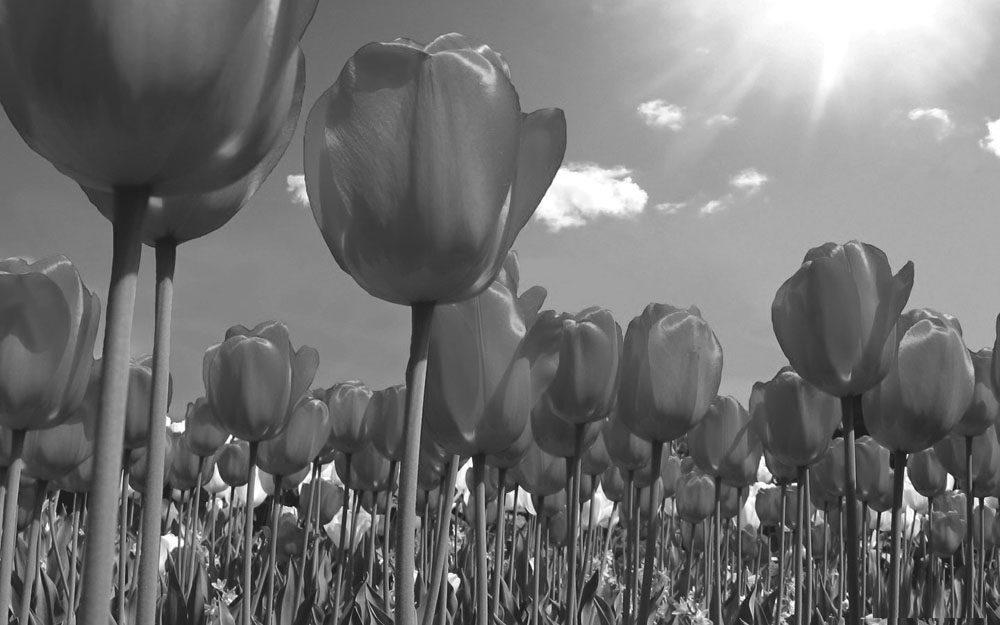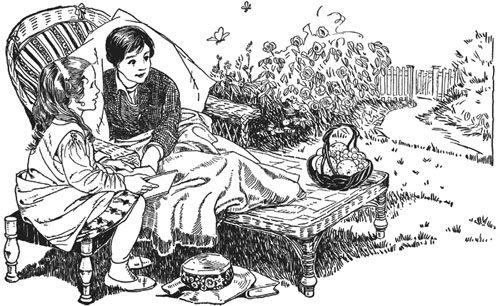黑色郁金香
2012-04-29
When I was a child growing up in The Netherlands1, I often begged my mother to tell me this story about an experience her family had at the end of World War II.
During the terrible last winter of the German occupation, food was very scarce in The Netherlands. People were so desperately hungry they began to eat small animals and many things not normally considered edible, including tulip bulbs.2 People discovered the bulbs could be cooked like potatoes or turnips, or even eaten raw.3
For centuries, my mothers family, the Van der Veldes, had owned a highly successful tulip business, which provided jobs for many in our village of Ridderkerk. Their bulbs were popular throughout Europe and abroad, and the family name was known far and wide4. But the war shut their business down, and during the winter of hunger, my grandfather, Arnoldus, donated all his tulip bulbs to feed the hungriest villagers.
All, that is, except for a few irreplaceable5 bulbs. For years, Arnoldus had been trying to cultivate6 a black tulip, something no gardener had ever been able to do. He was now very close. By careful selection, he had created a dark-purple tulip. These few bulbs he guarded vigorously to prevent people from stealing them for food. He did not even give them to his family to eat, because they would make just one meager meal, and eating them would destroy his chance of restarting his business and restoring his village after the war.7

One day, radio broadcasts announced that the war was over. There was great rejoicing8, but more hardships were still to come. The German forces that had occupied and terrorized our country for five long years started to withdraw, battalion by battalion.9 But as they pulled back, some soldiers deserted and fled toward Germany, sacking and looting as they went.10 There was much destruction, and the Dutch people still faced grave dangers.
My grandfather, Arnoldus, looked at his pale, thin children and realized that the hunger could continue for a long time as the war left poverty in its wake11. He wondered if it might be time to feed his precious bulbs to his children. Certainly it would be better than losing the bulbs to the marauding bands of fleeing German soldiers.12 After hours of agonizing13, he made his decision. He seized a shovel and went into the garden. There he found my mother, Albertha, then just seven, looking flushed and agitated.14
“Papa! Papa! I must tell you something,” Albertha said. Over her shoulder, Arnoldus saw a band of drunken, looting soldiers coming toward them down the street. He whispered to Albertha to run inside the house and frantically began digging for his bulbs. Over and over his shovel came up empty. He was too late. Someone had already stolen them.
Crazed with grief and rage, he ran toward the street screaming,“They have stolen my tulip bulbs!” Albertha, watching from the doorway, cried out and ran to stop him. Before she could reach Arnoldus, a German soldier raised his pistol15 and shot him. Although the German surrender had been signed, a curfew16 was still technically in effect, and my grandfather had violated it.
Arnoldus survived his wounds and mended slowly. When he could finally leave his bed, he sat by the window staring out into the garden. He so regretted that he hadnt given the bulbs to his family sooner. The war was over and spring was coming, but life remained very hard. Many houses had been bombed. There was little food and few jobs.
Finally the weather warmed, and Arnoldus was able to sit outside. Albertha stayed close to him, attending to his every need, rarely leaving him even to play with her friends. She had become quiet and reserved, although she had been a happy, bubbly child before the war.17 Sometimes she would try to cheer her father by pointing to the pile of rubble18 next door, all that was left of their neighbors bombed house. She reminded her father that at least their family still had each other and a roof above their heads. Arnoldus realized the truth in her words and often glanced over at the ruins to remind himself of how lucky they had been.
One day, he noticed something sprouting among the broken bricks and concrete.19 He pointed out the green leaves to Albertha. Suddenly, all her reserve left her. She began to cry hysterically.20 Between convulsive21 sobs, she told him that these were his black tulip bulbs. He held her close and listened with amazement as she told her story.
Just before her father was shot, Albertha had been in the garden when a friendly German soldier had approached her. Carl Meier was stationed in the familys neighborhood during the Occupation. He had Van der Velde bulbs in his own garden back home in Germany, and appreciated their value. Carl had watched as Arnoldus gave away the precious bulbs to feed his neighbors, and he suspected that there were more hidden away. The soldier warned Albertha that a band of German looters was on its way down the street. He urged her to hide the remaining bulbs away from the yard, which would surely be searched. And he begged her not to mention his name to anyone, as he could be court-martialed22 for his warning.
Just then, the laughing and shouting of drunken soldiers could be heard coming down the road. Carl Meier fled. With no time to summon her father, Albertha scrabbled in the dirt with her bare hands, scooped up the bulbs from their hiding place,23 and reburied them in the rubble next door.
As she clambered back over the fence into her own garden, she found her father digging with a shovel. She tried to tell him what she had done, but he was so intent on his work that he ignored her.24
For some time, it was uncertain whether Arnoldus would survive his gunshot wound. When he began to recover, Albertha went to retrieve the bulbs,25 knowing that seeing them would raise his spirits. She climbed over the fence and gasped with horror. An unstable wall had collapsed on the spot, covering the bulbs. It seemed impossible to the little girl that anyone could ever move the heavy slab26. Overwhelmed with sorrow, Albertha decided not to tell anyone what she had done.
However, during the last cruel days of winter, ice must have formed in the cracks of the wall, gently forcing them apart. With the warmth of spring, the ice had melted, and the tender shoots27 had made their way up toward the sun.
Arnoldus had survived, and so had his bulbs. Now father and daughter stood looking at the young green leaves.
It took some time, but my grandfather rebuilt his business, starting with those few bulbs. The rare dark-purple tulips eventually became an enormous source of income for the people in Ridderkerk and provided many muchneeded jobs. The recovery of Ridderkerk persuaded its people that there could again be happiness after so much misery, and new life after so much death. As the tulips rose from the ruins and came to bloom again, so did The Netherlands.
Although the Van der Veldes tried to locate Carl Meier, he was never found. But the family did find a way to honor his courage and kindness. When my mothers little brother was born the following year, the grateful family named him Karel, the Dutch version of “Carl.”

1. The Netherlands: 荷兰。
2. desperately: 〈口〉极度地;edible: 可食用的;bulb:(植物)鳞茎。
3. turnip: 芜菁甘蓝;raw: 生的,未煮过的。
4. far and wide: 到处,广泛地。
5. irreplaceable: 不能调换的,不能代替的。
6. cultivate: 种植,培植。
7. meager: 贫乏的,不足的;restore: 修复,重建。
8. rejoicing: 喜悦,高兴。
9.已占领荷兰并实施恐怖统治达五年之久的德国军队开始一营接一营地撤退。battalion:(陆军的)一营(大约有一千兵士)。
10. desert:(士兵)逃亡,从……开小差;sack: 洗劫,劫掠;loot: 抢劫,掠夺。
11. in ones wake: 随着……而来,作为……的结果。
12. marauding: 到处抢劫的,劫掠的;band:一伙,一群。
13. agonizing: 痛苦。
14. flushed: 兴奋的,激动的;agitated: 激动的,不安的。
15. pistol: 手枪。
16. curfew: 宵禁,戒严。
17. reserved:内向的,寡言少语;bubbly:生气勃勃的。
18. rubble: 碎石,瓦砾。
19. sprout: 发芽,长出;concrete: 混凝土。
20. reserve: 矜持,寡言;hysterically:歇斯底里地。
21.convulsive: 痉挛性的,抽搐的。
22. court-martial: 交军事法庭审判。
23. scrabble: 扒寻;scoop up: 铲起,挖出来。
24. clamber:(吃力地))攀登,攀爬;be intent on:对某事专心致志的。
25. recover: 恢复健康(体力、能力等);retrieve: 寻回,找回。
26. slab: (石、木等坚硬物质的)厚板,平板。
27. shoot: 幼苗,嫩芽。
